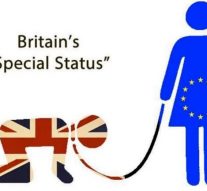
Does Europe need UK?
Opinions 6 September 2016Does Europe need UK? Now that the EU is passing through one of its worst moments in history, would it not be stronger as a German-centric Continental Europe?
The European Union is passing through one of the worst moments in its history. After decades spent in uniting European economies towards the (partly) achieved goal of the common market, the world financial crisis, which begun in 2008 and moved to the real economic sector in 2010, led to a raise of anti-European feelings.
If the decrease in production (and consumption) in many parts of Europe is entirely attributable to the lack of a fiscal and banking coordination within the EU or to a more general failure of the libertarian concept of a market-led economy is an argument alone to debate. Evidence shows that politicians grab easy votes by condemning the Euro and the supranational organisation that enforces it. From this point of view, Poland is only the last example of an unfortunate series of elections for pro-EU parties.
Read NEU’s selection of articles on Brexit for more information on its consequences.
Brexit: the story of a leader’s political bet
All began when the UK’s former Prime Minister, David Cameron, decided to call for a referendum in order to grant British citizens the opportunity to decide for the permanence of their country in the European Union. Cameron’s questioning of the effectiveness of the Union was one of the main reasons that led to his election in 2010, and the promise of a popular vote on UK European membership contributed to his re-election.
Cameron assured his voters that, by the end of 2017, they would have the chance to decide for their country’s future, alongside with the potential breakdown of the process of the European integration. And they had it on 24 June 2016. After the EU referendum, where British citizens decided to leave the European Union, next year will be strategic, since also Germans will be called to vote in order to judge upon Merkel’s third mandate.
There is, however, a great difference between the two leaders’ political bets. While Cameron has entrusted to his compatriots the weight of a decision that can potentially determine the end of the “United States of Europe” utopia, the German Chancellor will see whether her decision of letting hundreds of thousands of migrants into Germany made her Europe’s undiscussed political guide or not.
However, the focus of the discussion is another: do we really need United Kingdom in the European Union, or would we be stronger as a German-centric Continental Europe supranational organization?
Will Europe be stronger without the UK?
The loss of UK’s membership fee will shrink significantly the already suffering EU budget. Furthermore, UK is the fifth largest economy in the world, and most importantly, its capital London represents the biggest financial hub in the “old continent”. Most of UK’s trade is done with Europe, and this would lead to import-based UK industries to suffer from the scission, and to eventually look for other free-trade areas in the Northern hemisphere.
Politically, the loss of a nuclear-armed country, permanent member of the UN Security Council would mean a significant reduction in the negotiating power of the EU on the world stage.
On the other hand, the European Union’s political machine would benefit from UK’s estrangement, since lately all attempts of reaching consensus on foreign policies were abruptly interrupted by Cameron’s entourage.
When dealing with migration issues, which followed the Middle-East crisis of the last years, the EU found significant impediments coming from the United Kingdom, which decided to follow the Eastern European countries’ rigidity and unwillingness to cooperate by accepting refugees. Without the major political and economic weight represented by the UK, it would be much easier for the remaining “big three” (Germany, France and Italy) to act effectively and promptly on behalf of the smaller countries in the Union, thus providing efficient policies capable of managing arising crises.
What is interesting of Cameron’s decision to allow the referendum is the will to give the general public power on such an important issue. History taught us that when citizens were called upon to vote for European Union’s major changes the results led to a general disempowerment of the supranational organization.
In 2009, for example, the ratification of a European Constitution was abandoned following the refusal expressed via referendum of France and the Netherlands. The Constitution was later included in the Treaty of Lisbon of the same year, circumnavigating somehow the recently expressed popular will.
Now that British have decided to leave the European Union, the only thing we can hope is that they were fully aware of the earthquake they will cause to Brussels, taking their responsibilities for a future where Europe as a whole would be partly deprived of its actual bargaining power on the world scene. Yet, even this hope is lost since, as revealed by the analysis of Internet searches made in the small hours, many Britons may not have known exactly what they were voting for in the EU referendum.




